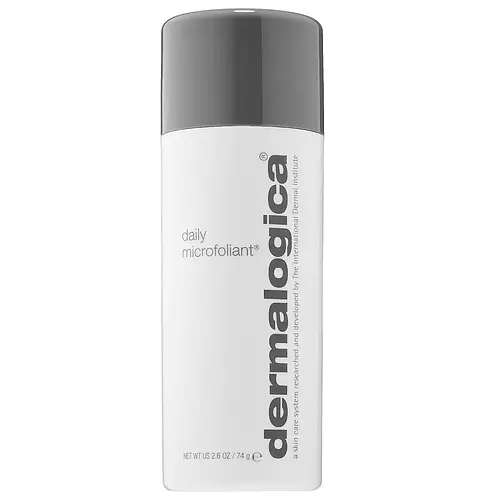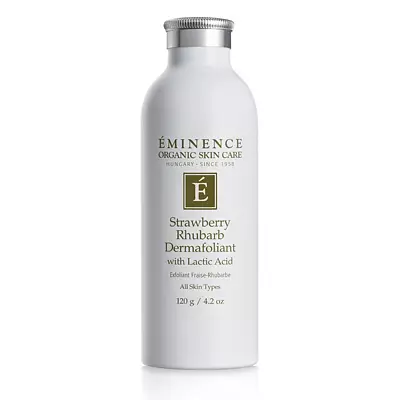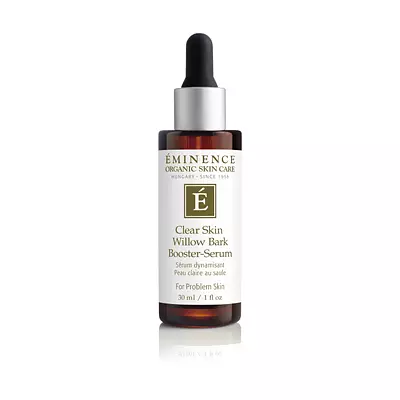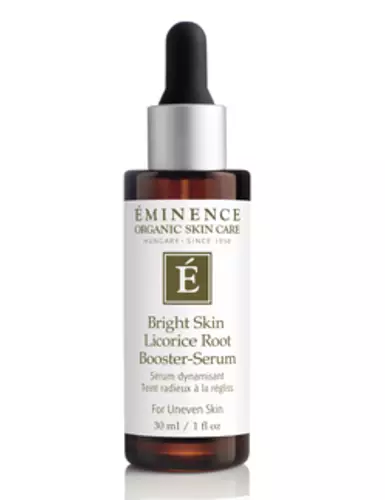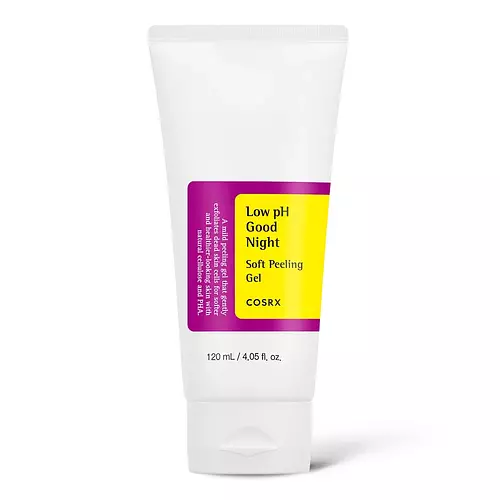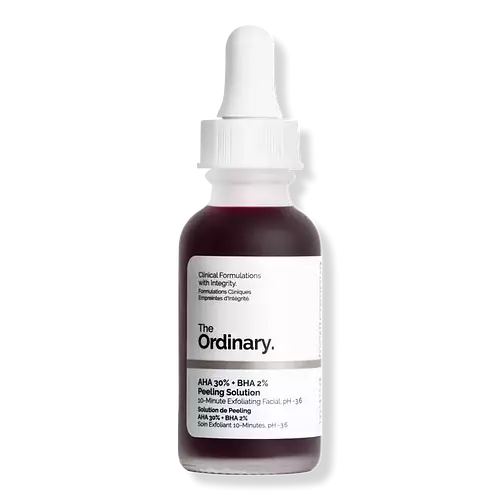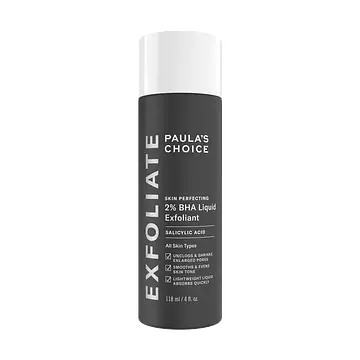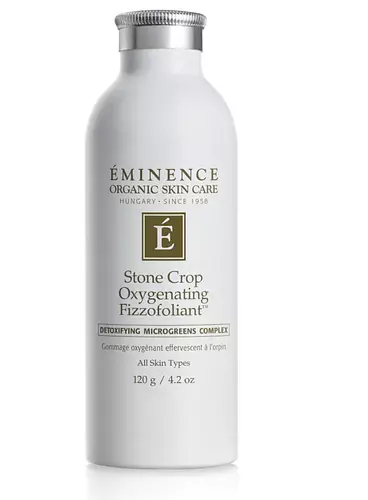
Eminence Organics Stone Crop Oxygenating Fizzofoliant Ingredients Explained
Published on February 09, 2023 Submitted by KateLexington_47
Overview
What it is
Exfoliator with 39 ingredients that contains AHA, exfoliants, Vitamin C and Vitamin E
Cool Features
It is vegan, cruelty-free, and reef safe
Suited For
It has ingredients that are good for anti aging, dry skin, brightening skin, sensitive skin, reducing pores, scar healing, dark spots and better texture
Free From
It doesn't contain any harsh alcohols, common allergens, parabens or silicones
Fun facts
This product is used in 2 routines created by our community.
We independently verify ingredients and our claims are backed by peer-reviewed research. Does this product need an update? Let us know.
Exfoliator with 39 ingredients that contains AHA, exfoliants, Vitamin C and Vitamin E
Quick info
You should know
Notable Ingredients
This product contains 2 ingredients that may have this attribute:
This product contains 1 ingredient that may have this attribute:
This product contains 1 ingredient that may have this attribute:
This product contains 4 ingredients that may have this attribute:
Benefits
This product contains 2 ingredients that may have this attribute:
This product contains 2 ingredients that may have this attribute:
This product contains 1 ingredient that may have this attribute:
This product contains 3 ingredients that may have this attribute:
This product contains 2 ingredients that may have this attribute:
This product contains 1 ingredient that may have this attribute:
This product contains 1 ingredient that may have this attribute:
This product contains 3 ingredients that may have this attribute:
This product contains 5 ingredients that may have this attribute:
Concerns
This product contains 1 ingredient that may have this attribute:
This product contains 2 ingredients that may have this attribute:
This product contains 3 ingredients that may have this attribute:
This product contains 1 ingredient that may have this attribute:
Ingredients 39
Oryza Sativa Starch is an absorbent and used to mattify the skin. It is a natural carbohydrate and the main component of rice. A more common name for this ingredient is 'rice starch'.
Citric Acid is an AHA derived from citrus fruits (think oranges, lemons, and limes!).
Sodium cocoyl isethionate is a natural ingredient from the fatty acids of coconut oil. It is a surfactant and helps with cleansing the skin.
Helianthus Annuus Seed Oil is the oil derived from the seeds of a Sunflower. Sunflower seed oil is non-fragrant. It is an emollient, meaning it helps to soften the skin.
Calcium Sulfate is an exfoliant and is a type of sulfate.
Malic Acid is an AHA derived from unripe fruit. The word "Malic" comes from the word "Malum". In Latin, "Malum" means apple.
Ascorbic Acid is is pure Vitamin C. This form makes up the largest amount of vitamin C found naturally in our skin.
Tocopheryl Acetate is AKA Vitamin E. It is an antioxidant and protects your skin from free radicals. Free radicals damage the skin by breaking down collagen.
Carica Papaya Fruit Extract comes from the papaya fruit. Papayas were first domesticated in Mexico and Central America.
Silybum Marianum Seed Oil is an oil and isn't fungal acne safe.
Lecithin is a term for a group of substances found in plants, animals, and humans. They are made up of mixture of fatty acids. These fatty acids usually are a mixture of phosphoric acid's choline ester connected to stearic, oleic, and palmitic acids. Most lecithins are created from plant ingredients scuh as sunflower.
Glycerin is already naturally found in your skin. It helps moisturize and protect your skin.
Aloe Barbadensis Leaf Juice comes from leaves of the aloe plant. Aloe Barbadensis Leaf Juice is best known for helping to soothe sunburns. It is also anti-inflammatory, moisturizing, antiseptic, and can help heal wounds.
Water. It's the most common cosmetic ingredient of all. You'll usually see it at the top of ingredient lists, meaning that it makes up the largest part of the product.
Parfum is a catch-all term for an ingredient or more that is used to give aroma to products. Parfum, or fragrance, can be a blend of hundreds of chemicals or plant oils. This means every product with "fragrance" or "Parfum" in the ingredients list is a different mixture.
Euterpe Oleracea Fruit Oil is an oil and isn't fungal acne safe.
Daucus Carota Sativa Root Powder is created from the orange and edible carrot.
Coconut water is the liquid found inside coconuts with hydrating, anti-inflammatory, and antioxidant properties.
Lycium Barbarum Fruit Extract comes from the Goji Berry. Goji berries are native to China and can be found across Eurasia.
Maltodextrin is a polysaccharide. It is derived from starch such as rice, corn, wheat, or potato starch.
Thioctic Acid is an enzyme and antioxidant. A more common name for this is Alpha Lipoic Acid.
Oryza Sativa Starch, Sodium Bicarbonate, Citric Acid, Phaseolus Angularis Seed Powder, Sodium Cocoyl Isethionate, Spinacia Oleracea Leaf Powder, Helianthus Annuus Seed Oil, Cicer Arietinum Seed Powder, Calcium Sulfate, Diatomaceous Earth, Malic Acid, Peat Water, Ascorbic Acid, Sempervivum Tectorum Extract, Tocopheryl Acetate, Carica Papaya Fruit, Brassica Oleracea Italica Sprout Extract, Raphanus Sativus Seed Extract, Trifolium Pratense Extract, Curcuma Longa Root Powder, Schisandra Chinensis Fruit Powder, Silybum Marianum Seed Oil, Lepidium Sativum Sprout Extract, Lecithin, Glycerin, Aloe Barbadensis Leaf Juice, Water, Parfum, Euterpe Oleracea Fruit Oil, Citrus Limon Juice, Malpighia Glabra Fruit, Emblica Officinalis Fruit Powder, Adansonia Digitata Fruit Extract, Myrciaria Dubia Fruit Juice, Daucus Carota Sativa Root Powder, Cocos Nucifera Water, Lycium Barbarum Fruit Extract, Maltodextrin, Thioctic Acid
Ingredient Ratings
Based on the number of likes and dislikes each ingredient has received.
Ingredients Explained
Oryza Sativa Starch is an absorbent and used to mattify the skin. It is a natural carbohydrate and the main component of rice. A more common name for this ingredient is 'rice starch'.
Rice starch is created by steeping broken grains in a caustic soda.
Rice extract has many skin benefits. Read more about rice extract here.
Learn more about Oryza Sativa StarchSodium Bicarbonate has a more famous name: Baking soda.
In cosmetics, it is used to adjust the acidity. Due to its white crystalline solid form, it can also be an abrasive (exfoliator).
This ingredient is water-soluble.
Learn more about Sodium BicarbonateCitric Acid is an AHA derived from citrus fruits (think oranges, lemons, and limes!).
If you spot Citric Acid near the end of an ingredient list, it's likely there as a pH adjuster rather than an active ingredient.
As an AHA, Citric Acid removes the top layer of skin cells from the newer layer of skin underneath. This helps skin to remove dark spots and look more even.
Read more about some other popular AHA's here:
Learn more about Citric AcidWe don't have a description for Phaseolus Angularis Seed Powder.
Sodium cocoyl isethionate is a natural ingredient from the fatty acids of coconut oil. It is a surfactant and helps with cleansing the skin.
By binding to water and oil, it helps gently clean skin. It also helps the spreadability of the product.
Sodium cocoyl isethionate is also added to help create foam without drying the skin. However, this is depending on the amount of Sodium cocoyl isethionate.
Sodium Cocoyl Isethionate may not be fungal acne safe.
Learn more about Sodium Cocoyl IsethionateHelianthus Annuus Seed Oil is the oil derived from the seeds of a Sunflower. Sunflower seed oil is non-fragrant. It is an emollient, meaning it helps to soften the skin.
Sunflower seed oil contains many fatty acids. The fatty acids found in sunflower seeds include (from highest amount to least): linoleic acid, myristic acid, palmitic acid, stearic acid, arachidic acid, oleic acid, and linolenic acid.
These fatty acids help the skin create ceramides. Ceramides play a role in repairing the skin barrier.
Helianthus Annuus Seed Oil helps moisturize the skin. This in turn helps the skin look more rejuvenated and smoother.
Sunflowers are rich in vitamin E.
Historians believe Indigenous cultures of North America domesticated sunflowers before corn. Thus they relied on sunflower oil for a variety of uses. One such use is moisturizing skin and hair.
Sunflower seed oil may not be fungal acne safe. We recommend speaking with a professional if you have any concerns.
Learn more about Helianthus Annuus Seed OilCicer Arietinum Seed Powder is an exfoliant.
Calcium Sulfate is an exfoliant and is a type of sulfate.
Diatomaceous Earth is an exfoliant.
Malic Acid is an AHA derived from unripe fruit. The word "Malic" comes from the word "Malum". In Latin, "Malum" means apple.
Malic Acid has both AHA and BHA properties, but is considered an AHA because its AHA properties are stronger. Like other AHAs, it removes the top layer of old and dead skin to reveal the newer layer underneath. It also helps with improving fine lines, wrinkles, skin tone, skin texture, and acne blemishes.
Due to its exfoliating properties, you should wear SPF when using Malic Acid.
Read more about some other popular AHA's here:
Learn more about Malic AcidWe don't have a description for Peat Water.
Ascorbic Acid is is pure Vitamin C. This form makes up the largest amount of vitamin C found naturally in our skin.
Not only is vitamin C great for your overall health and immune system, it also has plenty of benefits on your skin.
Vitamin C is best used for brightening skin. It improves dark spots, acne scars, and hyperpigmentation. This is because it blocks the process of skin darkening when exposed to UV.
Remember: Vitamin C should not replace sunscreen!
Your skin uses vitamin C to build collagen. Collagen is one key component in having a strong skin barrier and plump skin. Vitamin C also plays a role in regulating collagen, thus making it effective in improving wrinkles and fine lines.
Ascorbic acid shows potent antioxidant activity. As an antioxidant, it helps fight free-radicals. Free-radicals are molecules that may damage your skin cells. These antioxidants also protect skin against UV damage.
The best formulations include Vitamin E and/or ferulic acid. These two ingredients help stabilize and provide a boost in the benefits of ascorbic acid. This is because ascorbic acid becomes unstable when exposed to UV and air. In fact, you can tell your ascorbic acid has oxidized when it turns an orange-yellow color.
Ascorbic acid is generally compatible with other ingredients. However, using ascorbic acid with other active ingredients might cause irritation. Two ingredients: copper ions and benzoyl peroxide, will inactivate ascorbic acid completely.
Read more about other types of Vitamin C:
Foods rich with vitamin C include oranges, strawberries, broccoli, bell peppers, and more. When consuming Vitamin C, your skin receives a portion of the nutrients.
Learn more about Ascorbic AcidWe don't have a description for Sempervivum Tectorum Extract.
Tocopheryl Acetate is AKA Vitamin E. It is an antioxidant and protects your skin from free radicals. Free radicals damage the skin by breaking down collagen.
One study found using Tocopheryl Acetate with Vitamin C decreased the number of sunburned cells.
Tocopheryl Acetate is commonly found in both skincare and dietary supplements.
Learn more about Tocopheryl AcetateCarica Papaya Fruit Extract comes from the papaya fruit. Papayas were first domesticated in Mexico and Central America.
This fruit extract contains papain and chymopapain, two enzymes with exfoliating and anti-inflammatory properties. One study shows papain may help in scar healing. Papaya is also a rich source of antioxidants and Vitamin A.
We don't have a description for Brassica Oleracea Italica Sprout Extract.
We don't have a description for Raphanus Sativus Seed Extract.
We don't have a description for Trifolium Pratense Extract.
We don't have a description for Curcuma Longa Root Powder.
We don't have a description for Schisandra Chinensis Fruit Powder.
Silybum Marianum Seed Oil is an oil and isn't fungal acne safe.
We don't have a description for Lepidium Sativum Sprout Extract.
Lecithin is a term for a group of substances found in plants, animals, and humans. They are made up of mixture of fatty acids. These fatty acids usually are a mixture of phosphoric acid's choline ester connected to stearic, oleic, and palmitic acids. Most lecithins are created from plant ingredients scuh as sunflower.
Lecithin is an emollient. Emollients help soften the skin and creates a barrier to keep moisture in.
As an emulsifier, it also helps prevent water and oil ingredients from separating. Lecithin can help ingredients be better absorbed by the skin. The phospholipids in Lecithin can produce liposomes. Liposomes help other ingredients get through the skin barrier.
Learn more about LecithinGlycerin is already naturally found in your skin. It helps moisturize and protect your skin.
A study from 2016 found glycerin to be more effective as a humectant than AHAs and hyaluronic acid.
As a humectant, it helps the skin stay hydrated by pulling moisture to your skin. The low molecular weight of glycerin allows it to pull moisture into the deeper layers of your skin.
Hydrated skin improves your skin barrier; Your skin barrier helps protect against irritants and bacteria.
Glycerin has also been found to have antimicrobial and antiviral properties. Due to these properties, glycerin is often used in wound and burn treatments.
In cosmetics, glycerin is usually derived from plants such as soybean or palm. However, it can also be sourced from animals, such as tallow or animal fat.
This ingredient is organic, colorless, odorless, and non-toxic.
Glycerin is the name for this ingredient in American English. British English uses Glycerol/Glycerine.
Learn more about GlycerinAloe Barbadensis Leaf Juice comes from leaves of the aloe plant. Aloe Barbadensis Leaf Juice is best known for helping to soothe sunburns. It is also anti-inflammatory, moisturizing, antiseptic, and can help heal wounds.
Aloe is packed with good stuff including Vitamins A, C, and E. These vitamins are antioxidants, which help fight free-radicals and the damage they may cause. Free-radicals are molecules that may damage your skin cells, such as pollution.
Aloe Barbadensis Leaf Juice also contains sugars. These sugars come in the form of monosaccharides and polysaccharides, folic acid, and choline. These sugars are able to help bind moisture to skin.
It also contains minerals such as calcium, 12 anthraquinones, fatty acids, amino acids, and Vitamin B12.
Learn more about Aloe Barbadensis Leaf JuiceWater. It's the most common cosmetic ingredient of all. You'll usually see it at the top of ingredient lists, meaning that it makes up the largest part of the product.
So why is it so popular? Water most often acts as a solvent - this means that it helps dissolve other ingredients into the formulation.
You'll also recognize water as that liquid we all need to stay alive. Talk about multi-purpose! If you see this, drink a glass of water. Stay hydrated!
Learn more about WaterParfum is a catch-all term for an ingredient or more that is used to give aroma to products. Parfum, or fragrance, can be a blend of hundreds of chemicals or plant oils. This means every product with "fragrance" or "Parfum" in the ingredients list is a different mixture.
In the US, the alternative name for parfum is 'fragrance'. The term 'fragrance' is not regulated in many countries. In many cases, it is up to the brand to define this term.
For instance, many brands choose to label themselves as "fragrance-free" because they are not using synthetic fragrances. However, their products may still contain ingredients such as essential oils that are considered a fragrance. One example is Calendula flower extract. Essential oil ingredients still impart a scent or 'fragrance'.
Depending on the blend, it can cause allergies and sensitivities on the skin. Some ingredients that are known EU allergens include linalool and citronellol.
Products use parfum often to give products a scent or cover up smells of different ingredients.
The bottom line is: not all fragrances/parfum/ingredients are created equally. If you are worried about fragrances, we recommend taking a closer look at an ingredient. And of course, we always recommend speaking with a professional.
Learn more about ParfumEuterpe Oleracea Fruit Oil is an oil and isn't fungal acne safe.
Citrus Limon juice is also lemon juice.
While lemon juice contains antioxidants and vitamins, it can sensitize the skin.
The acidity of lemons may work as an astringent for acne. This can cause sensitivity. Lemon juice can also increase photosensitivity, or sensitivity to the sun.
Learn more about Citrus Limon JuiceWe don't have a description for Malpighia Glabra Fruit.
We don't have a description for Emblica Officinalis Fruit Powder.
We don't have a description for Adansonia Digitata Fruit Extract.
Myrciaria Dubia Fruit Juice is an antioxidant.
Daucus Carota Sativa Root Powder is created from the orange and edible carrot.
Carrots contain beta-carotene, a potent antioxidant.
Lycium Barbarum Fruit Extract comes from the Goji Berry. Goji berries are native to China and can be found across Eurasia.
Goji berries contain polysaccharides, carotenoids and flavonoids. Antioxidants help your body fight off free-radical molecules. These molecules are unstable and may damage your skin. By making free-radicals more stable, antioxidants can help with anti-aging.
Polysaccharides help hydrate the top layer of skin due to its ability to mimic natural carbohydrates.
Learn more about Lycium Barbarum Fruit ExtractMaltodextrin is a polysaccharide. It is derived from starch such as rice, corn, wheat, or potato starch.
In food, Maltodextrin is used to improve the texture and thicken a product. Due to its structure, it can help create a gel texture. As an emulsion stabilizer, it helps keep the ingredients in a product together.
As a polysaccharide, Maltodextrin has moisturizing properties. Polysaccharides are a type of carbohydrate. The top layer of skin uses polysaccharides to retain water, keeping the skin hydrated.
Maltodextrin is water soluble and has a sweet taste.
Learn more about MaltodextrinThioctic Acid is an enzyme and antioxidant. A more common name for this is Alpha Lipoic Acid.
Alpha Lipoic Acid can be naturally found in the mitochondria of every cell.
Antioxidants help fight free-radicals. Free-radicals are molecules that may damage your skin cells. The antioxidants in Alpha Lipoic Acid have been shown to fight damage from cigarette smoke.
Studies also show Alpha Lipoic Acid plays a role in wound healing.
Thioctic Acid will break down when exposed to sunlight.
Many foods contain thioctic acid, including tomato, brussel sprouts, spinach, and broccoli.
Learn more about Thioctic AcidWhen to use
How this product is used by our community
Directions
1. Dispense a small amount of dry product to wet palm of hand and add a few drops of water.
2. Rub hands together to create a foam and apply to face using circular motions, careful to avoid the...
1. Dispense a small amount of dry product to wet palm of hand and add a few drops of water.
2. Rub hands together to create a foam and apply to face using circular motions, careful to avoid the delicate areas around the eye.
3. Massage into skin before rinsing thoroughly with water and patting dry.
Compared With
Here are some products that it's often compared with
More Eminence Organics Products
See all Eminence Organics productsMore Exfoliators
See all exfoliatorsWe're dedicated to providing you with the most up-to-date and science-backed ingredient info out there.
The data we've presented on this page has been verified by a member of the SkinSort Team.
Read more about us

